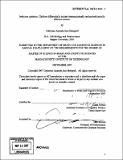Judicious imitation : children differentially imitate deterministically and probabilistically effective actions
Author(s)
Hooppell, Catherine Amanda Jane
DownloadFull printable version (2.623Mb)
Alternative title
Differential imitation
Other Contributors
Massachusetts Institute of Technology. Dept. of Brain and Cognitive Sciences.
Advisor
Lara Schulz.
Terms of use
Metadata
Show full item recordAbstract
Three studies look at whether the assumption of causal determinism (the assumption that all else being equal, causes generate effects deterministically) affects children's imitation of modeled actions. We show that, even when the frequency of an effect is matched, both preschoolers and toddlers imitate actions more faithfully when modeled actions are deterministically rather than probabilistically effective. A third study suggests that preschoolers' imitation is affected, not just by whether the agent's goal is satisfied but also by whether the action is a reliable means to the goal. Children's tendency to generate variable responses to probabilistically effective modeled actions could support causal learning.
Description
Thesis (S.M.)--Massachusetts Institute of Technology, Dept. of Brain and Cognitive Sciences, 2007. Includes bibliographical references (leaves 43-46).
Date issued
2007Department
Massachusetts Institute of Technology. Department of Brain and Cognitive SciencesPublisher
Massachusetts Institute of Technology
Keywords
Brain and Cognitive Sciences.